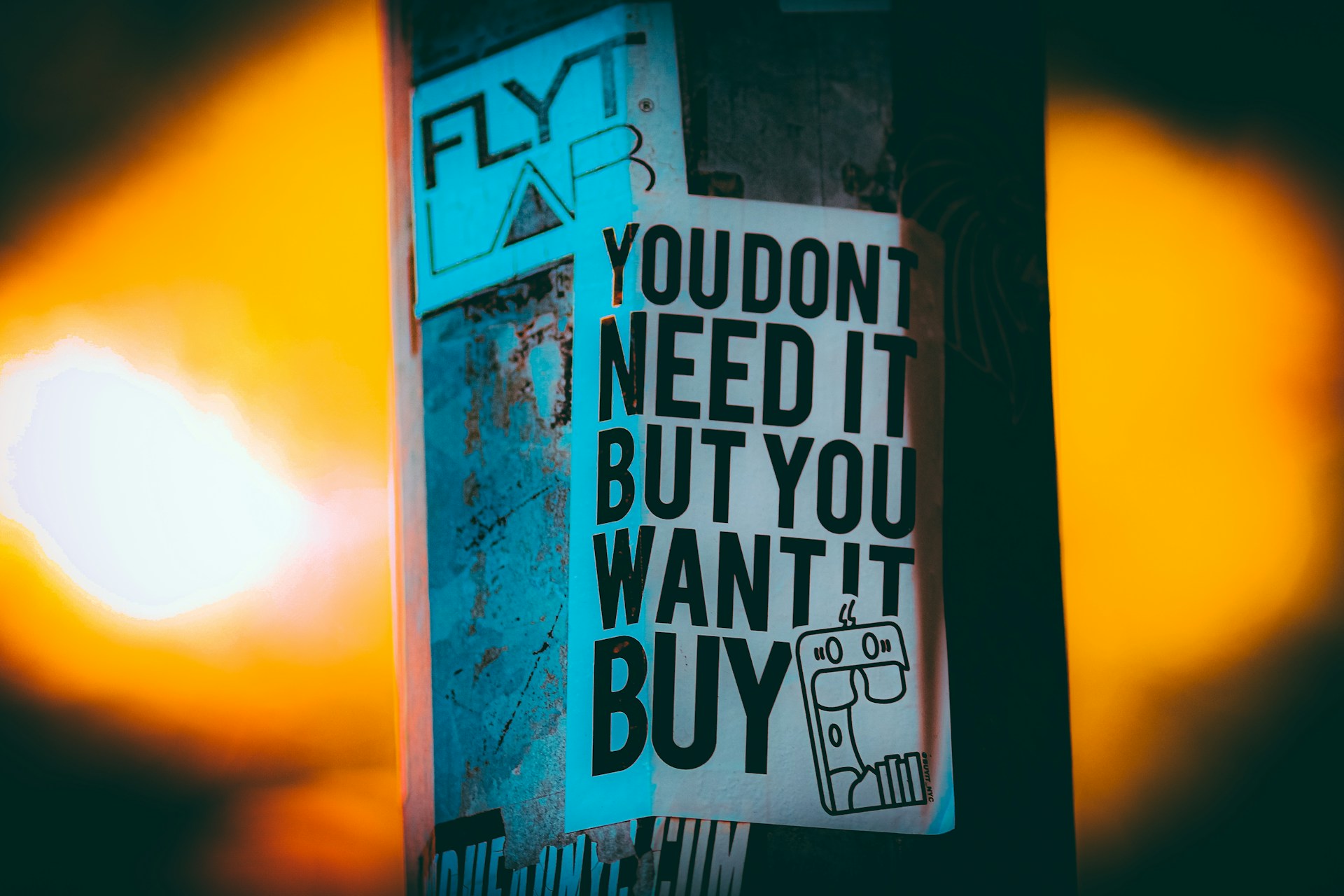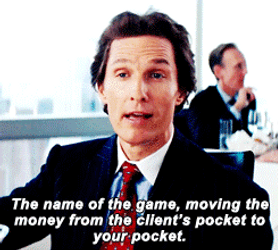How to sell your products without getting the ick (i.e. ethically)
Struggling with that awkward tension when you’re a brand doing good stuff in the world, but you still have to participate in capitalism and sell things? Read this.

Happy Earth Day! 🌍
This week, we’ve been thinking about that awkward tension when you’re a brand doing genuinely good stuff in the world, but you still have to, y’know, *participate in capitalism and sell things*.
It’s something that so many of our clients have struggled with.
(One brand we worked with a few years ago really, really hated selling their stuff. Even though most of the money went to women’s charities, they still felt gross actively trying to persuade people to spend their money.)
That really stuck with us because outside of work, we both blast Billy Bragg, try to be conscious consumers, minimise our footprints, be good citizens of the earth, etc…
And as an agency, we plant 100 trees every time we wrap up a project (and are working hard to try and increase that). We signed the Clean Creatives pledge to not work with big polluters or fossil fuel companies. And we strive to only work with brands that give a shit about something beyond profit.
And yet, our jobs are to help brands sell more stuff. It’s hard to imagine a more capitalist-friendly, boot-licky job than a copywriter.
And, of course, capitalism is the main driver of the climate emergency.
Which leads to this weird, uncomfortable tension between what we believe, what we do and the fact that we give advice about how consumer psychology makes somebody X% more likely to check out.

Sociologist Max Weber called this conflict the “Iron Cage” of capitalism. His idea was that we live in a modern capitalist society that’s so focused on efficiency, productivity, and economic survival that it’s hard to make ethical decisions even when we want to.
So on a day when we’re all thinking about our impact and what we can do better, we thought we’d break down how we navigate this tension of trying to do good in a system designed to reward doing bad.
(Note: we haven’t got this perfect yet. We’re still working through some of the nuances, some contradictions and working towards doing good as good as we can. But it’s a solid start. Hopefully it’ll help you feel a bit less ick when you have to sell stuff, too.)
💡 This week’s big idea: Ethical copywriting doesn’t mean never selling. It means selling with honesty, empathy, and values.
Whenever we work with mission-led brands, there’s always this elephant in the room.They’ve created a product they genuinely care about. Sometimes it’s better for the planet, sometimes it’s better for the people who use it or fairer to the people involved… but selling it feels icky.
“Am I helping people live more sustainably, or just convincing them to buy more stuff they don’t need? Does this contribute to the rampant consumerism that we’re taking a stand against?”
Now, most of the time, some this tension is counteracted by what they do with their profits and their ethical logistics, etc… but some of it comes down to the fact that selling inherently involves convincing people to buy something they otherwise wouldn’t.
And there’s definitely an ickiness to that.
But the longer we’ve been doing this, the more we’ve realised something important: it’s not the act of selling that’s the problem. It’s how you do it.So the solution isn’t to pull back or try and opt out of capitalism (which is impossible right now anyway.)
It’s to write with more care, more thought, more truth, more respect for the customer…Not less selling. Better selling.
Here’s how we do it 👇
You can write persuasively without being manipulative
The internet is full of advice telling you to use any trick, tip and tactic to grow faster. Scarcity. FOMO. All caps. Countdown timers. So many exclamation points!!! The most recent one? Pretending to “accidentally” send discount codes to your whole list to drive immediate sales…
And that stuff 100% works.

But if you’re a brand that wants to do good, those copywriting techniques can leave you feeling like you need a long shower.
The good news is, you don’t have to write like that.
You can write copy that:
🙌 Respects the customer’s intelligence
🙌 Gives them the info they need to make an informed decision
🙌 Makes them feel good for choosing your product, not guilty if they don’t
How? By doing things like making them the hero, giving them copy that lines up with how they feel about themselves, leading with purpose not product…
(Each of those links out to an article we’ve written on the topic if you want to dig deeper into the how to of it all.)
Those slow growth tactics aren’t as quick as the “Grow 10X overnight” tactics, but they’re still persuasive as hell. They still sell. And they keep your integrity intact.
In other words, don’t write to force customers towards a decision. Write like you’re giving them the information they need to make an informed decision in the way that they’re receptive to. Then trust that they’ll make the right call.
Aha! But what about using consumer psychology in your copy? Isn’t that a bit manipulative?
☝️ That’s exactly the thought we kept crashing into. (And, tbh, we still do sometimes.) However…
You can use psychology and still sleep at night
If you’ve been reading us for a while, you’ll know: we talk a lot about how your customers’ brains work.
Cognitive bias, decision science, all that good (nerdy) stuff.
And you might wonder: isn’t that just Derren Brown-ing people into buying? Manipulating and tricking them?

Honestly? Some consumer psychology tricks are very much like that. (Hence why we don’t talk about scarcity copywriting very often.)
But on the other hand, some consumer psychology is just about communicating in a way that makes people hear what you’re saying.
Here’s the difference:
We use consumer psychology to make it easier for people to say “yes” to things that they actually want to do. It’s there to help overcome minor objections. We don’t use it to trick people.
Now, would it be even more ethical to just show a picture of your product and say, “Here it is. If you want it, cool. If not, no worries”?
100%. Wouldn’t that be nice? (Although, think of the analysis paralysis.)
That’s the ultimate non-pushy, zen-monk approach.

The problem is, you know who doesn’t play by those rules?
Big brands. Capitalist megaliths. The brands that never hesitate to use every psychological trick in the book to pad the pockets of their shareholders, who then use that money to invest in more earth-polluting companies, which then continue the same cycle…
So here’s where we landed: if we can use ethical psychology, honest persuasion, and good old-fashioned understanding what makes people tick to help brands who want to do better in the world? To help take a little cash away from the polluters and giants and make the world a better place?
That’s a net positive.
Sure, it’s not perfect. (Spoiler alert: nothing is under capitalism. ✊)
But it’s a hell of a lot better than leaving the playing field to the bad actors.
So, when you see us talk about the science behind what makes a product stick or how to write words that sell, know this: we’re all about honest influence, not manipulation.
Ethical copywriting is about giving your customers the info, context, and yes — sometimes a little nudge — to make a choice they’ll feel good about.
No guilt. No tricksy BS. No manipulation.
So, what does this mean in practice?
Several times, the two of us have had a crisis of confidence where we’ve wondered “shouldn’t we just like… not work for brands that sell stuff? Should we focus on just helping charities?”
👆And maybe there’s a case for that. (To be fair, we do work with charities too.)
But here’s what we know: the brands trying to do good? The ones fighting to reduce waste, plant trees, source their products or ingredients ethically, pay fair wages, put the planet first…
To make an impact and change the way capitalism works, they still need to sell things.
They still need to be seen.
They still need to be profitable.
Because that’s how they keep doing the good work.
So if we can help those brands show up in a way that’s honest and powerful?
If we can help customers choose them instead of a greenwashed alternative or a polluting mega corp?
Then that’s a win.
In a broken system, ethical copywriting is a small act of rebellion.

It’s a quiet choice to be better. It’s choosing to work with the system while also nudging it toward change.
Because ultimately, ethical copy doesn’t mean never persuading.
It means never tricking. It means never baiting-and-switching to make a quick buck.
And it means trusting that your customer can make the right decision when your copy gives them everything they need.
(Luckily, audiences are changing too. More and more customers prefer ethical brands with ethical marketing than the spammy, scammy BS.)
☝️ That’s where we’re at so far.
We know we haven’t properly nailed it yet, but every day we’re trying to do a little bit more to help brands that do good show up and do words gooder. (And do a bit of good ourselves.)
Now, over to you:
Is this something you struggle with? Do your values as a brand ever clash with the techniques you feel like you need to do in order to grow? Let us know. We read and reply to every email.







